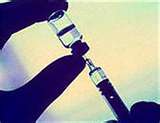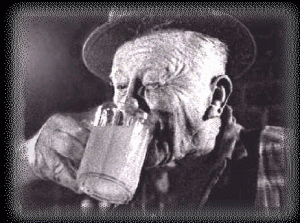by Your ER Doc on November 11, 2009
I believe this could be a new protocol for cardiac stress testing.
 Recently on the late shift, the nurses on the telemetry unit were alerted to an elderly female patient who was having tachycardia. Her heart rate had been steady at around 80, but for no clear reason it accelerated to about 150 beats per minute. The charge nurse walked quickly over to investigate.
Recently on the late shift, the nurses on the telemetry unit were alerted to an elderly female patient who was having tachycardia. Her heart rate had been steady at around 80, but for no clear reason it accelerated to about 150 beats per minute. The charge nurse walked quickly over to investigate.
The patient noted that she had been having some insomnia, so she decided to read her romance novel. Suddenly, she had a very realistic hallucination.
“What did you see dear?” asked the nurse.
“Well, it was a very good looking man, who just walked into my room and asked where the grocery store was. And, he was . . . completely naked.” She admitted.
The nurse reassured the patient that it was nothing, and tucked her back into bed, and then chuckled her way back to the nurses station. A few minutes later while doing some charting, she was surprised to see another patient standing in front of the counter. It was a 40 year old man admitted for gallstones. He had been given a dose of Ambien for sleep about an hour before.
“Excuse me, can you show me where the grocery store is?” asked the man.
“I certainly can,” said the nurse, who then gently walked the sleepwalking (and completely naked) patient back to his room.
by Your ER Doc on November 7, 2009
 I was attempting to build a deck today, pretending to be a handy guy, and as per my usual custom thinking about the worst construction accidents I have seen.
I was attempting to build a deck today, pretending to be a handy guy, and as per my usual custom thinking about the worst construction accidents I have seen.
These are not just morbid ruminations of my darker side, but useful ways to avoid being hurt. Standing on a ladder while using a circular saw to cut off a piece of trim really gets the imagination going, because of the sheer number of different ways to lacerate, contuse, dismember, and abrade your body. For instance, I must remember to keep the ladder secure so I don’t tip over, breaking my wrist and impaling my face on a piece of rebar.
I can’t cut off a piece of lumber, and let it fall on my foot and then break my neck when I stumble in pain. Perhaps most importantly, I want to make sure I don’t position my body over a fence so that if I do fall off the ladder, I don’t straddle the fence and crush my testicles. Even when I’m finished using the circular saw, I must remember not to set it down while it’s running, so that it doesn’t run over my foot and amputate my toes. In fact, I’ve gotten so paranoid about all of these scenarios that sometimes I find myself just staring at my power tools, too afraid to pick them up.
Perhaps this is why the deck is unfinished after 6 months.
by Your ER Doc on July 12, 2009
 I was recently asked by a police officer why doctors prescribe so much opiate medication knowing full well that we are in the midst of an addiction crisis. Many people are hooked on opiates; pills, patches and injections, and the problem is getting worse. Anyone who works in the ER is aware of “drug seeking†patients who may not have a real medical problem, but repeatedly come into the ER seeking narcotics for various types of pain. The police officer sincerely wanted to know why doctors are so willing to prescribe high doses of opiates when the costs of addiction are so high, and this question has recently been brought into the spotlight with the death of Michael Jackson.
I was recently asked by a police officer why doctors prescribe so much opiate medication knowing full well that we are in the midst of an addiction crisis. Many people are hooked on opiates; pills, patches and injections, and the problem is getting worse. Anyone who works in the ER is aware of “drug seeking†patients who may not have a real medical problem, but repeatedly come into the ER seeking narcotics for various types of pain. The police officer sincerely wanted to know why doctors are so willing to prescribe high doses of opiates when the costs of addiction are so high, and this question has recently been brought into the spotlight with the death of Michael Jackson.
It’s a difficult question to answer, but I feel there are several sources of pressure put upon physicians to provide these medications. First, when dealing with a patient who is in pain, or appears to be, it can be impossible to sort out when a patient needs opiates for legitimate reasons, and when it is merely feeding a long term addiction. We are trained to provide comfort and relief from suffering to our patients, and we generally will err on the side of treating pain, rather than withholding addictive medications.
Additionally, physicians and hospitals are now obsessed with patient satisfaction. We are monitored constantly, at the level of the hospital, the ER and individual physician. When satisfaction goes up, physicians are rewarded, and when it goes down their very jobs may be at stake. If a doctor takes a “hard line†with opiate seeking patients, satisfaction numbers will predictably plummet. Not giving some patients the opiates that they want and expect will often times result in arguments, profanity, and calls and letters to administration.
Finally, pain is now considered by the medical establishment as the “new vital sign.â€Â When patients present to the ER, they are asked to rate their pain 1 through 10, and then this number is followed all the way through discharge or admission. The implications with regard to opiate addicted patients can be profound. If a person states they have a 10/10 pain on arrival and it has not decreased whatsoever at discharge, the physician appears to be at best complacent, at worst sadistic.
For the above reasons, I believe the medical establishment is helping to fuel the opiate crisis in the US, and it is time to re-evaluate our expectations and our processes.
by Your ER Doc on July 5, 2009
I’ve been in the UK for the last 2 weeks, and over here many of the papers say he died of heart attack. However, in the United States, when you say “heart attack†that is the same as a myocardial infarction . This means that the coronary arteries get clogged up, and are unable to deliver oxygen and blood to the heart muscle. Cardiac arrest is when the heart stops beating, whatever the actual cause. In some people, cardiac arrest occurs from a heart attack, but it can also be due to medications, arrythmia, blood clots, trouble breathing, etc. When an autopsy is done, the pathologist will check for many different causes of cardiac arrest, including the possibility of drug and alcohol intoxication.
. This means that the coronary arteries get clogged up, and are unable to deliver oxygen and blood to the heart muscle. Cardiac arrest is when the heart stops beating, whatever the actual cause. In some people, cardiac arrest occurs from a heart attack, but it can also be due to medications, arrythmia, blood clots, trouble breathing, etc. When an autopsy is done, the pathologist will check for many different causes of cardiac arrest, including the possibility of drug and alcohol intoxication.
by Your ER Doc on June 16, 2009
 A middle aged man recently drove to the ER looking to get some medical attention for a rash that he had for over a year. It was a bit unusual to come to the ER for a chronic rash, but I’ve seen stranger things for sure. The timing was stranger still, since it was about 2am. But let’s give him the benefit of the doubt, and assume he was just trying to come in when the ER wasn’t too crowded.
A middle aged man recently drove to the ER looking to get some medical attention for a rash that he had for over a year. It was a bit unusual to come to the ER for a chronic rash, but I’ve seen stranger things for sure. The timing was stranger still, since it was about 2am. But let’s give him the benefit of the doubt, and assume he was just trying to come in when the ER wasn’t too crowded.
It wasn’t though–pretty much packed and full of cops who were there for a car crash and an assault. This turned out to be bad news for the man with the rash since he was completely drunk. He knew it was bad mojo when he pulled into the parking lot and saw all the squad cars. If his plan was to be inconspicuous, that didn’t work too well, because he drove in the wrong way on a one-way driveway. As calmly as possible, he tried to perform a casual 3-point U-turn. Unfortunately, he ended up on the curb, and nearly hit the ambulance entrance doors. This did not go unnoticed by our boys in blue, and the man was quickly arrested for DUI, his car was impounded, and he was given a notice to appear before the court. At that point, he should have just been glad he wasn’t going to spend the night at county jail, but he was pretty mad. He stomped over to register in the ER and demanded a blood alcohol level, since he “wasn’t even drunk!”
1 hour later and a measured blood alcohol level of 0.25, the man was ready for discharge.
“Well what’s my diagnosis?!” he demanded.
“Looks like you’re drunk, sir.”
 Recently on the late shift, the nurses on the telemetry unit were alerted to an elderly female patient who was having tachycardia. Her heart rate had been steady at around 80, but for no clear reason it accelerated to about 150 beats per minute. The charge nurse walked quickly over to investigate.
Recently on the late shift, the nurses on the telemetry unit were alerted to an elderly female patient who was having tachycardia. Her heart rate had been steady at around 80, but for no clear reason it accelerated to about 150 beats per minute. The charge nurse walked quickly over to investigate.








 I was attempting to build a deck today, pretending to be a
I was attempting to build a deck today, pretending to be a  I was recently asked by a police officer why doctors prescribe so much opiate medication knowing full well that we are in the midst of an addiction crisis. Many people are hooked on opiates; pills, patches and injections, and the problem is getting worse. Anyone who works in the ER is aware of
I was recently asked by a police officer why doctors prescribe so much opiate medication knowing full well that we are in the midst of an addiction crisis. Many people are hooked on opiates; pills, patches and injections, and the problem is getting worse. Anyone who works in the ER is aware of  . This means that the coronary arteries get clogged up, and are unable to deliver oxygen and blood to the heart muscle. Cardiac arrest is when the heart stops beating, whatever the actual cause. In some people, cardiac arrest occurs from a heart attack, but it can also be due to medications, arrythmia, blood clots, trouble breathing, etc. When an autopsy is done, the pathologist will check for many different causes of cardiac arrest, including the possibility of drug and alcohol intoxication.
. This means that the coronary arteries get clogged up, and are unable to deliver oxygen and blood to the heart muscle. Cardiac arrest is when the heart stops beating, whatever the actual cause. In some people, cardiac arrest occurs from a heart attack, but it can also be due to medications, arrythmia, blood clots, trouble breathing, etc. When an autopsy is done, the pathologist will check for many different causes of cardiac arrest, including the possibility of drug and alcohol intoxication. A middle aged man recently drove to the ER looking to get some medical attention for a rash that he had for over a year. It was a bit unusual to come to the ER for a chronic rash, but I’ve seen stranger things for sure. The timing was stranger still, since it was about 2am. But let’s give him the benefit of the doubt, and assume he was just trying to come in when the ER wasn’t too crowded.
A middle aged man recently drove to the ER looking to get some medical attention for a rash that he had for over a year. It was a bit unusual to come to the ER for a chronic rash, but I’ve seen stranger things for sure. The timing was stranger still, since it was about 2am. But let’s give him the benefit of the doubt, and assume he was just trying to come in when the ER wasn’t too crowded.